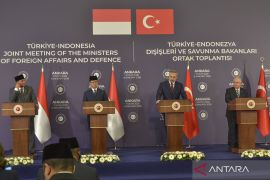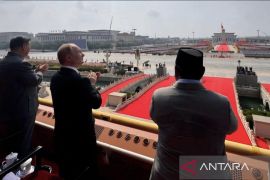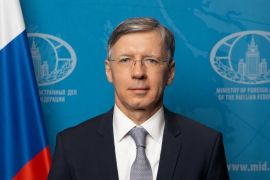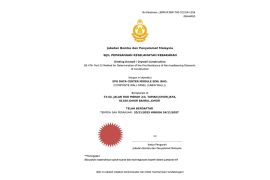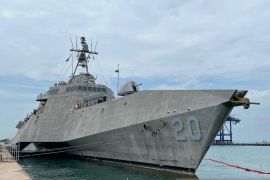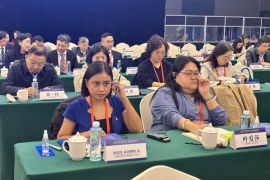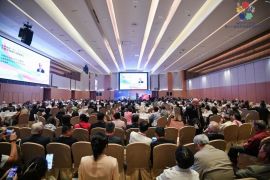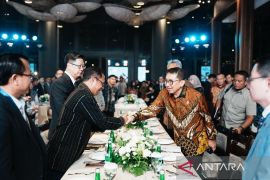Southeast Asian countries emphasized the centrality of ASEAN when regional and global dynamics require this bloc to embrace a common mechanism to achieve common interests.
The ASEAN Charter clearly states that ASEAN's main goal is to maintain the bloc's centrality and a proactive role as the main driver of relations and cooperation with external partners in an open, transparent, and inclusive regional architecture.
The concept of ASEAN centrality, as stated in the ASEAN Outlook in the Indo-Pacific, must become the dominant regional platform for addressing common challenges and interacting with forces outside the region.
Since taking on the position of chairman of ASEAN 2023, Indonesia has emphasized this concept strongly, and it is indeed increasingly vital, given that Southeast Asia is striving to be pulled back and forth by the world's dominant powers, especially China and the United States.
Ironically, the two superpowers accuse each other of trying to co-opt ASEAN. The two countries even appear to be attempting to prevent ASEAN from leaning towards one of them.
China appears to be dominant in wanting to see the ASEAN disengage from the United States in order to get rid of the influence of its main competitor country, even though its method is quite gentle through an economic approach.
On the other hand, the United States is seemingly keen to make the ASEAN a stronghold against China's competition on various fronts, from politics and security to the economy.
In Jakarta, during the series of the 43rd ASEAN Summit this week, the stance of the two countries became increasingly tough in spite of wrapping up the tough stance with a commitment to a stronger relationship with the ASEAN.
This can be seen, among other things, from China's strong message that reminded ASEAN to not be provoked by external actors so as not to turn Southeast Asia into a new area of conflict.
Chinese Premier Li Qiang even reminded Southeast Asia to avoid a "new Cold War" in this region. At the ASEAN-China Summit yesterday, Li stated that all countries must deal with differences and disputes properly.
"At the moment, it is imperative to reject taking sides, bloc confrontation and new Cold War," Li stated at the ASEAN-China Summit, Wednesday (Sept 6).
Li's remark is an affirmation of the equally strong statement by Chinese Foreign Minister Wang Yi at a conference organized by an Indonesian think tank on September 3. At that time, Wang reminded ASEAN to not be made a pawn by external forces.
Related news: President Jokowi encourages stronger ASEAN-partners cooperation
Related news: ASEAN is important factor for unity in divided world: Guterres
Now at the same level
Wang did not name the external power, but it is believed that he meant the United States.
A more blunt voice was made by the Global Times, an English-language Chinese media that is the mouthpiece of the Chinese government.
According to the Global Times, China has proven itself to have respect and support for ASEAN through actions and important cooperation projects, such as the construction of a high-speed train.
China is currently advancing a four-point proposal to get closer to the ASEAN, including through cooperation in building economic growth centers, strengthening interconnectivity, and boosting industrial and supply chain cooperation.
That is China's positive outlook towards ASEAN, which according to the Global Times, has never attempted to form a new multilateral platform in the region to weaken ASEAN's position.
The statement was a satire against the United States which the Global Times said is more rhetorical than embodying a commitment to ASEAN with concrete steps.
The United States rejected this claim by stating that it had done a lot for ASEAN and would continue to do so.
"The United States has a long-term commitment to Southeast Asia and more broadly to the Indo-Pacific," according to Vice President of the United States Kamala Harris, who visited Jakarta in place of Joe Biden, who decided to be absent and will attend the G20 Summit in India.
According to the White House, in the 2024 fiscal year, the Biden-Harris administration is proposing a budget of US$1.2 billion for economic, development, and security assistance in ASEAN countries, in addition to assistance worth US$90 million, specifically for the ASEAN to strengthen ASEAN institutions.
Harris' presence in Jakarta comes exactly a year after the ASEAN raised the level of cooperation with the United States to become a comprehensive strategic partnership, which is the highest level in international cooperative relations.
United States-ASEAN relations are now at the same level as China-ASEAN relations, which received a similar status in November 2021.
This indicates that both countries view the ASEAN as vital, although at this ASEAN Summit, their top leaders -- President Joe Biden and President Xi Jinping -- were not present.
Although it is seen as being vital by the two countries, which both contribute greatly to ASEAN, the Southeast Asian bloc does not want to be forced to choose between the two.
On the other hand, the ASEAN is keen that the two major countries understand that this regional organization's partnership with them is based on one condition that everything must be centered on ASEAN.
To make it more unified
President Joko Widodo emphasized at the 11th ASEAN-US Summit in Jakarta on September 6 that all ASEAN partners must support ASEAN centrality and avoid unhealthy competition.
On the other hand, borrowing Singapore Prime Minister Lee Hsien Loong's statement, the US and China must demonstrate leadership in overcoming various global problems, so that the two countries continue to hold dialogue, build strategic trust at all levels, and strive for greater cooperation.
In this way, a positive atmosphere creates a positive ecosystem for the ASEAN and then other regions as well as the world.
However, sometimes, the efforts are not synchronized with the situation on the ground. ASEAN, China, and the United States often show rhetoric that is inconsistent with practice.
In the case of ASEAN, the regional organization often does not show unity in several issues, including the issues of Myanmar and the South China Sea dispute.
On the other hand, the United States is actively mobilizing sub-regional blocs, which can actually erode ASEAN centrality, by intensifying the Quad with India, Japan, and Australia, realizing AUKUS with Australia and the UK, to the trilateral pact with Japan and South Korea.
Those situations make China furious to later mention that there is a tendency for a "new Cold War", including in Southeast Asia.
Ironically, China is also actively projecting military power at a level that is often seen as provoking other countries, including Indonesia, which has no conflicting claims in the South China Sea.
The approach of the US and China in Southeast Asia is already in a cycle of action and reaction without knowing who started it first.
However, maybe, in that situation, the centrality of ASEAN becomes even more important.
It is important because the concept can keep ASEAN from being trapped as a pawn of China or the United States in addition to becoming a red line that no one, including China and the US, can cross so that competition between them does not escalate into an open conflict that is detrimental to all parties.
For ASEAN itself, the awareness to keep regional centrality grounded can accelerate ASEAN integration, so that the regional organization becomes more unified, independent, and ready to face the challenges of the times.
Related news: Jokowi highlights ASEAN-UN unity in fostering world peace
Related news: ASEAN maintains unity, centrality amid global challenges
Translator: Jafar M Sidik, Cindy Frishanti Octavia
Editor: Sri Haryati
Copyright © ANTARA 2023


